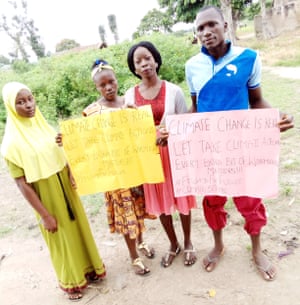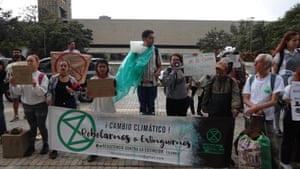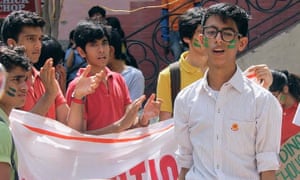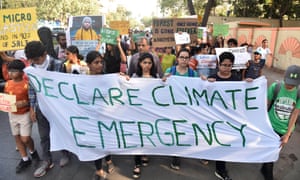Young activists call for north-south solidarity to tackle climate emergency that threatens to exacerbate inequality and conflict
Carbon
footprints do not get much smaller than those of young Nigerians like
Oladosu Adenike. Living in a country with the world’s most extreme
poverty, she has had neither the years nor the money to rack up anything
more than a fraction of the gargantuan climate debt of the average
elderly European or American.
Yet, in the decades ahead, it is post-millennials in the global south like her who are almost certain to suffer greater hardships, as extreme weather and what has been termed “climate apartheid” amplify existing problems of inequality, food shortages, crimes and conflict.
Adenike will confront those fears in the coming week along with millions of others across the world as she joins the global climate strike, which kickstarts with a global day of action on Friday.
In what looks set to be one of biggest demonstrations in world history, the Greta Thunberg generation have called on their elders to stand alongside them to ease a burden that will grow enormously in the coming decades.
But just as important as the intergenerational injustice of mature children trying to save the planet while infantile parents seem hell-bent on wrecking it, is the global north-south divide between the rich who destabilised the atmosphere and the poor who will be the first to suffer the consequences. We talked to three climate strikers in Africa, Asia and South America, and considered how their futures would be affected by climate disruption.

Yet, in the decades ahead, it is post-millennials in the global south like her who are almost certain to suffer greater hardships, as extreme weather and what has been termed “climate apartheid” amplify existing problems of inequality, food shortages, crimes and conflict.
Adenike will confront those fears in the coming week along with millions of others across the world as she joins the global climate strike, which kickstarts with a global day of action on Friday.
In what looks set to be one of biggest demonstrations in world history, the Greta Thunberg generation have called on their elders to stand alongside them to ease a burden that will grow enormously in the coming decades.
But just as important as the intergenerational injustice of mature children trying to save the planet while infantile parents seem hell-bent on wrecking it, is the global north-south divide between the rich who destabilised the atmosphere and the poor who will be the first to suffer the consequences. We talked to three climate strikers in Africa, Asia and South America, and considered how their futures would be affected by climate disruption.

‘I don’t feel I have a future’
“Psychologically, it makes me feel insecure,” says Adenike, who has just finished university and is now doing one year’s compulsory social service. “In Nigeria, the crisis is already here and it will have more and more impact in the coming years.”She reels off a long list of reasons for her sense of unease: drought in the north of Nigeria is worsening conflict and driving migration. Floods are affecting wider areas and adding to pressures on displaced people’s camps. Food prices are rising because agricultural land is ruined. Livestock are dying because of heat stress, which has also killed three of her pet puppies. “I really don’t know whether we are going to win this race [against runaway climate change]. I think about it every day,” she said.
The blaze was extinguished, but the 19-year-old says he lives in such fear of what comes next that he has suffered depression and debilitating panic attacks. “I have a lot of climate anxiety. Several times I have fallen very low because of this. Emotionally, I’m in a bad way,” he says. “I am not able to concentrate on university or other social activities. I can’t go out with my friends without talking about it, because the whole time I’m thinking about the future of the planet.”
Previous generations might have pinned their hopes on economic development, which would lift people out of poverty and raise living standards. But the old model has lost its lustre among some of the young, who are as likely to associate growth with cancer, obesity and emissions, as health, wealth or happiness.
Veer Ojas Khanna, a 15-year-old school student in Gurugram, India, was horrified when his family were relocated from their forest home to a newly built so-called “millennium city” on the outskirts of Delhi. “I realised how bad the most polluted city in the world really was,” he said. “I live in a blanket of smog.”
Heat is a growing problem. This June, Delhi sweltered in a record temperature of 48C, killing at least a dozen people. Elsewhere in India, extreme weather is becoming more destructive. Khanna recently volunteered to rebuild a school in Kerala that had been destroyed by flash floods. He said the widening drought in other regions has led to a rise in suicides by farmers, who are ruined by crop failures. The taps ran dry for millions of people in the megalopolis of Chennai and the Indian environment ministry has warned 22 cities could run out of water by the end of next year. Delhi is among them. “It’s shocking,” Khanna said.
Climate change is an amplifier, and not just of the weather. It also exacerbates social problems – worsening inequality, increasing resource shortages, escalating conflicts and prompting migration from ever wider areas.
UN officials have warned the world may be on the verge of an era of climate apartheid in which an elite minority will retreat into air-conditioned homes behind walls built ever higher to keep out rising seas and growing throngs of migrants left homeless and hungry by crop-failures, climate disasters and conflict.
This is evident between and within nations. Heat inequality is already an issue in Nigeria. The night is not bringing the cooling relief it used to provide in the past. Adenike says more poor people are sleeping outside their homes because temperatures are unbearable inside. This raises security concerns because there are more bodies on the streets overnight. Adenike said this was one of the reasons she was concerned for her safety.
There is scant prospect of any relief. In the next decade, there is a good chance the world will experience at least one year in which global heating hits 1.5C, which is the lower end of the “safe” target set by world leaders at the Paris climate conference in 2015. When today’s young are in their 30s and 40s, that will become more common as temperatures creep towards 2C and beyond. With each fraction of a degree of temperature rise, fires, floods, droughts and extreme heat intensify, and natural life support systems degrade.

“The saddest part is Colombia’s glaciers will no longer exist by 2050. And there is nothing we can do about it,” Giraldo said. He prefers not to dwell on what lies ahead. “I feel like I’m in an eternal present, like Groundhog Day. I am not able to think about the future because I don’t feel I have a future. This is unnerving. It is black, very black. When I think about the future I see nothing. I only see destruction.”
The strain on the young has been building for several decades. In the global north, baby boomers were replaced by the more serious generation X, then by frugal millennials, and now by the fiercely earnest generation Greta. Instead of Woodstock or Live Aid, they are growing up on a cultural diet of zombie and apocalypse films and TV series.
These imagined futures are shaped by dark realities. On top of climate instability, today’s teens face huge demographic pressure as fertility rates fall, lifespans lengthen (which means fewer children to look after the elderly) and the collapse of nature and climate make it harder to ignore the ecological limits on economic growth. The young, especially in developing countries, will face more competition from their peers over living space and resources that have already been run-down by developed countries and previous generations.

Adenike says leaders in Nigeria and across the global south do not yet treat the climate as an emergency. More importantly, neither do enough leaders in wealthier countries that have more power and greater culpability. On average, Americans use 60 times more energy than Nigerians. Europeans 30 times more, the Chinese 20 times more, and Indians four times more. “What happens to us from 2030 to 2050 is in the hands of today’s leaders. The best we can do is to advocate and take climate action that will induce them to do something. I am still hopeful we can beat the worst predictions of the scientists,” she said.
While Trump defaces weather maps with a sharpie and Brazil’s Bolsonaro tweets that environmentalism is about poo, the young are mobilising, campaigning and setting an example of how to live within limits, with less self-indulgence and more focus on political transformation.
Youth activists hope this week’s strike can trigger what climate scientist Katherine Heyhoe describes as a collective “oh shit!” moment, when people finally realise the costs of climate inaction are far greater than the solutions. If that succeeds, next year’s US presidential election could mark the point when humanity slams the brakes on its drive toward the abyss and tries to set a new direction with a series of Green New Deals that would have to be bigger than the Manhattan Project, the moon race and the second world war rolled into one if it is to stabilise the climate.
If this shift spreads, this could usher in exciting, tumultuous times for Adenike and her contemporaries as they enter their late 20s and 30s. Governments would fund up forests, renewable energy and public transport, and tax down fossil fuels, exhaust-emitting cars and steakhouses. Humanity’s relationship with nature would be transformed more radically than at any time in history.
If the “oh shit” moment has truly arrived before 2030, today’s strikers may look back at Trump and Bolsonaro as the last and worst of a dying fossil-fuelled, extractive oligarchy. But the chances of this best-case scenario are slim and the window is closing fast. Climate chaos will intensify and could still slip out of control. If countries in the global south are to cope, they will need support to make homes and infrastructure more resilient against extreme weather, and for power supplies to switch from coal to renewables. Whether they get that help depends on a political shift, which is why activists like Adenike, Giraldo and Khanna urge not just the old to stand with the young, but the north to stand with the south.
Without that solidarity, inequality will grow, nationalism will rise, conflict will increase, migration will surge and the future will look very bleak for these young activists.
“At the rate things are going, I’m not sure I’ll be alive by 2050,” Khanna said. “If things continue as they do, I don’t think I will have the strength to fight. That’s very scary.”

No comments:
Post a Comment